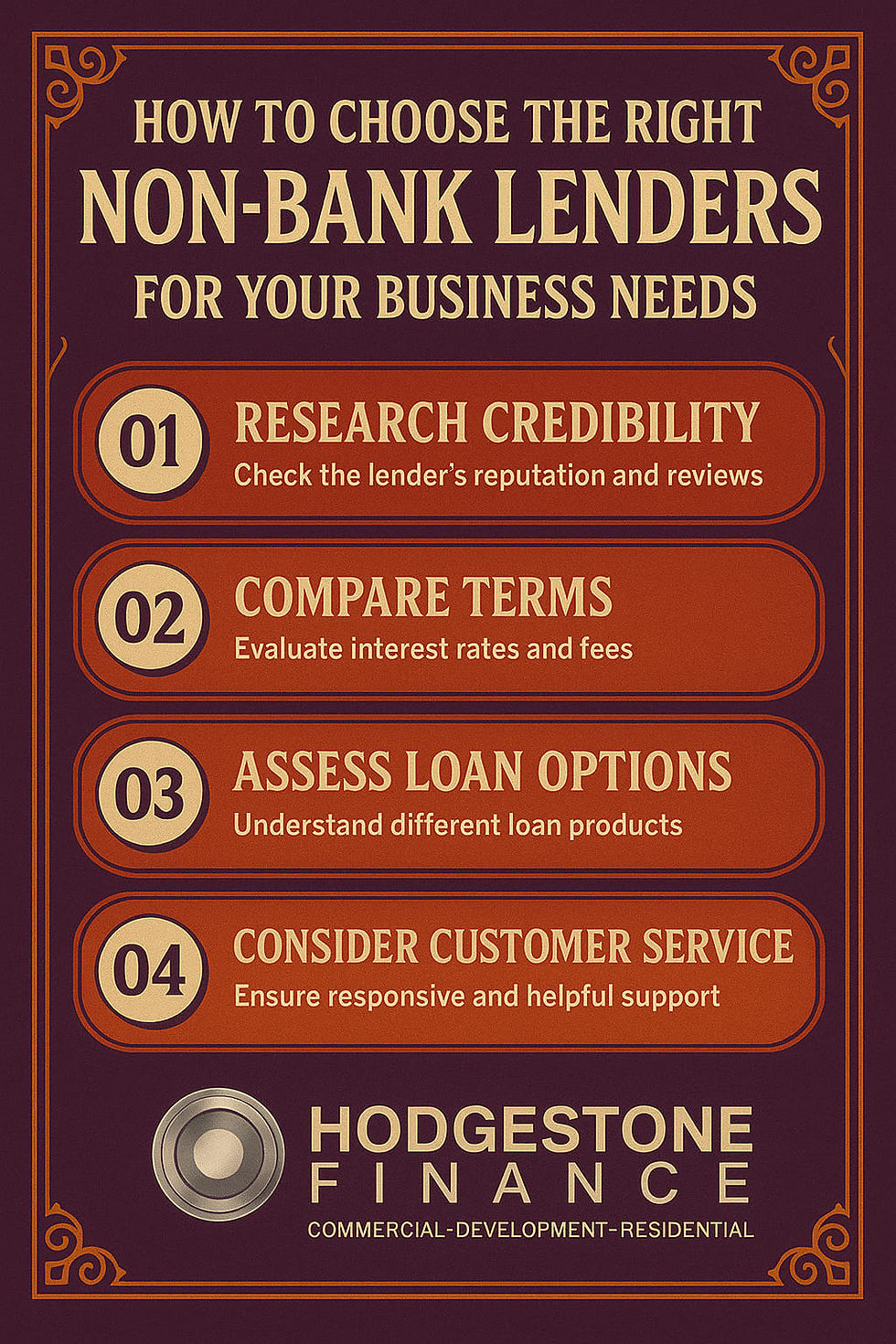How to Choose the Right Non-Bank Lenders for Your Business Needs
- Kate Westall
- Oct 7, 2025
- 8 min read
Ever wondered why your mate's business got funding in 48 hours whilst you're still waiting for your bank to return your calls? Have you noticed how traditional banks seem to have a checklist that excludes more businesses than it helps? What if there was a better way to secure business funding without jumping through endless hoops?

The Australian business finance landscape has transformed dramatically over the past decade, with non-bank lenders emerging as genuine alternatives to traditional banking institutions. These innovative financial providers are filling crucial gaps in the market, offering faster approvals, more flexible terms, and solutions tailored to modern business needs. Whether you're a startup struggling to meet bank criteria or an established business needing quick capital for growth opportunities, non-bank lenders might hold the key to unlocking your business potential.
This guide will walk you through everything you need to know about choosing the right non-bank lender for your specific business needs in Australia. You'll learn how to spot legitimate providers, understand the true costs involved, compare different options effectively, and avoid common pitfalls that could cost you thousands. By the end, you'll have a clear roadmap for making an informed decision that aligns with your business goals and financial situation.
What Exactly Are Non-Bank Lenders? (And Why Should You Care?)
Non-bank lenders are financial institutions that provide loans and credit facilities without being traditional banks or credit unions. Operating outside the conventional banking system, they’re not bound by the same strict regulations, allowing them to offer innovative, flexible lending solutions. Think of them as the disruptors of the finance world – they've identified gaps in traditional banking services and built business models to address them.
The Key Differences Between Banks and Non-Bank Lenders
The biggest difference lies in how these institutions operate and make decisions. Traditional banks rely on rigid criteria, automated credit scoring systems, and lengthy approval processes that can take weeks or even months. Non-bank lenders, however, often use holistic assessment methods, considering factors beyond just your credit score, such as cash flow patterns, future contracts, or industry-specific performance indicators that banks might overlook.
Speed is a defining factor. While a bank might take three weeks to process your application, many non-bank lenders in Australia can provide approval within 24-48 hours. This agility stems from streamlined processes, modern technology, and decision-makers who understand that business opportunities don’t wait. Additionally, non-bank lenders often specialise in specific industries or loan types, offering tailored solutions for businesses in sectors like hospitality, construction, or retail.

Types of Non-Bank Lenders Available in Australia
The Australian market boasts a variety of non-bank lenders, each catering to different business needs:
· Online Lenders: Platforms like Prospa, Moula, and OnDeck offer fully digital applications and quick funding, excelling in small to medium business loans. They often approve applications banks reject.
· Peer-to-Peer (P2P) Lenders: These connect businesses with investors, bypassing traditional intermediaries. Examples include RateSetter and SocietyOne.
· Private Lenders and Family Offices: Ideal for larger deals or property-backed loans, offering flexibility and personal relationships.
· Equipment Finance Specialists: Companies like FlexiCommercial focus on financing machinery, vehicles, or technology.
· Invoice Financiers: Providers like Waddle and Timelio advance funds against outstanding invoices to manage cash flow.
When Should Your Business Consider a Non-Bank Lender?
Timing is critical in business, and knowing when to explore non-bank lenders can mean the difference between seizing an opportunity and missing out. These lenders aren’t just for desperate situations – many successful Australian businesses strategically choose them for their unique advantages.
Signs Traditional Banking Isn’t Meeting Your Needs
If your bank treats you like just another account number, it might be time to look elsewhere. Warning signs include:
· Repeated loan rejections despite profitable operations.
· Delays causing missed business opportunities.
· Inflexible terms that don’t align with your cash flow cycles.
· Demands for personal guarantees that risk your family home.
· A lack of understanding of your industry’s unique needs.
For example, a Sydney-based cafe owner might find banks fixated on historical financials, ignoring recent growth from a new location. Non-bank lenders often assess current performance, making them better suited for dynamic businesses.
Common Scenarios Where Non-Bank Lending Makes Sense
Non-bank lenders shine in scenarios like:
· Seasonal Businesses: Tourism operators in Queensland or retailers in Melbourne relying on Christmas sales benefit from repayment structures matching income cycles.
· Startups and Young Businesses: Banks often demand two years of trading history, but non-bank lenders like Prospa fund businesses as young as six months old.
· Rapid Growth: Need inventory for a large order? Non-bank lenders can fund within days.
· Recovering Businesses: Lenders like Moula focus on current performance, not past setbacks.
· Property Developers and Importers: Need bridging finance or trade finance? Non-bank lenders offer speed and flexibility.
What Types of Business Loans Do Non-Bank Lenders Offer?
Non-bank lenders in Australia provide a wide range of loan products, often surpassing traditional banks in variety and specialisation. These solutions are designed to match how modern businesses operate.
Short-Term Finance Options
Short-term business loans (3-24 months) are ideal for bridging cash flow gaps or seizing immediate opportunities. Non-bank lenders offer:
· Short-Term Business Loans: Faster approvals and lenient criteria compared to banks, though rates may be higher (8-20% p.a.).
· Working Capital Loans: Help manage daily operations during growth or seasonal fluctuations.
· Merchant Cash Advances: Repayments adjust based on sales volume, perfect for businesses with variable income like Perth restaurants or Brisbane retailers.
Equipment and Asset Finance
Non-bank equipment financiers like FlexiCommercial revolutionise asset acquisition:
· Offer hire purchase agreements or leases.
· Finance higher percentages of equipment costs.
· Provide same-day approvals for loans under $100,000, with funding in 48 hours.
· Understand industry-specific asset lifecycles, e.g., financing a coffee machine for a Melbourne cafe or an excavator for a Darwin construction firm.
Invoice Financing and Cash Flow Solutions
Invoice financing transforms accounts receivable into immediate capital:
· Advance up to 90% of invoice values within 24 hours.
· Selective financing lets you choose which invoices to fund (e.g., Waddle’s model).
· Supply chain finance pays suppliers early for discounts while extending your payment terms.
Property-Backed Business Loans
Non-bank lenders excel in complex property-backed lending:
· Fund property development, commercial real estate purchases, or business expansion using property as security.
· Offer bridging finance for time-sensitive deals, e.g., settling a Sydney commercial property in 14 days.
· Provide creative solutions like second mortgages or caveat loans.
How Do I Know If a Non-Bank Lender Is Legitimate?
With the rise of online and fintech lenders, verifying legitimacy is critical. Australia’s robust regulations help, but due diligence is essential.
Essential Credentials and Licences to Check
· Australian Credit Licence (ACL): All legitimate non-bank lenders must hold an ACL or operate under one. Verify on ASIC’s professional registers.
· Industry Affiliations: Membership in the Australian Finance Industry Association (AFIA) or Commercial Asset Finance Brokers Association (CAFBA) signals credibility.
· ABN and GST Registration: Basic but essential for filtering out dubious operators.
Red Flags to Watch Out For
· Upfront Fees: Legitimate lenders don’t charge fees before loan approval.
· Guaranteed Approvals: Promises of approval regardless of circumstances are a scam.
· High-Pressure Tactics: Be wary of lenders pushing you to sign quickly or discouraging independent advice.
· Lack of Transparency: Avoid lenders with no Australian presence, free email addresses, or missing privacy policies.
Where to Verify Lender Credentials in Australia
· ASIC’s MoneySmart: Check licensed lenders and warning lists.
· ASIC Connect: Review company registrations and histories.
· Australian Financial Complaints Authority (AFCA): Confirm membership for dispute resolution.
· Reviews: Check Google Reviews, Trustpilot, and ProductReview.com.au for patterns. Ask for references from industry peers.
What Interest Rates and Fees Can I Expect from Non-Bank Lenders?
Understanding the true cost of non-bank finance goes beyond headline rates. While rates may be higher than banks, the speed and flexibility often justify the cost.
Understanding the True Cost of Non-Bank Finance
· Interest Rates: Typically 8-30% p.a., depending on loan type, term, and risk profile. Property-backed loans may be closer to bank rates (8-12%), while unsecured loans are higher (15-30%).
· Comparison Rates: Include fees for a clearer cost picture. A 1.5% monthly rate equals 18% annually before fees.
· Factor Rates: Common in merchant cash advances, e.g., a 1.3 factor rate means repaying $1.30 per dollar borrowed.
Hidden Fees to Ask About Before Signing
· Establishment Fees: Zero to thousands, sometimes a percentage of the loan.
· Ongoing Fees: Monthly account-keeping or early repayment penalties.
· Default Rates: Can double interest costs after a missed payment.
· Other Charges: Fees for security documentation, term variations, or dishonoured payments.
Comparing Rates: Non-Bank vs Traditional Options
A bank at 6% p.a. might seem cheaper than a non-bank lender at 15%, but factor in:
· Opportunity Costs: A bank’s six-week approval could cost more in missed opportunities than the interest differential.
· Flexibility: Non-bank lenders often allow extra repayments or payment holidays, adding value.
· Soft Costs: Time and stress spent on bank applications versus streamlined non-bank processes.
Making Your Final Decision: A Step-by-Step Approach
Choosing the right non-bank lender requires a structured approach to align with your business goals.
Assessing Your Business’s Specific Needs
· Define your funding purpose and amount.
· Consider timelines and repayment capacity based on realistic cash flow.
· List non-negotiables (e.g., speed) versus nice-to-haves (e.g., low fees).
· Plan for future financing needs to choose a lender that supports long-term growth.
Shortlisting Your Top Three Options
· Create a comparison spreadsheet with rates, fees, terms, and approval times.
· Weight factors based on priorities (e.g., speed for urgent needs).
· Research lender reputation via reviews and client references, focusing on their behaviour during tough times.
Negotiating Better Terms
· Use competing offers to leverage better rates or waived fees.
· Negotiate terms like graduated repayments or seasonal adjustments.
· Clarify personal guarantee requirements or default provisions before signing.
Questions and Answers: Common Questions About Non-Bank Lenders in Australia
Q: What are the main advantages of choosing a non-bank lender over a bank in Australia?
Ans: Non-bank lenders offer faster approvals (often 24-48 hours), more flexible terms tailored to industries like tourism or retail, and lenient eligibility criteria. For example, startups in Sydney or businesses recovering from setbacks find non-bank lenders more accommodating than banks requiring extensive trading history.
Q: Are non-bank lenders regulated in Australia?
Ans: Yes, legitimate non-bank lenders must hold an Australian Credit Licence (ACL) or operate under one, regulated by ASIC. They must also be AFCA members for dispute resolution. Always verify credentials on ASIC’s MoneySmart or professional registers.
Q: How quickly can I get funding from a non-bank lender?
Ans: Many non-bank lenders, like Prospa or OnDeck, provide approvals within 24-48 hours and funding shortly after. For instance, invoice financing from Waddle can advance funds within a day of invoice submission.
Q: What types of businesses benefit most from non-bank lenders?
Ans: Seasonal businesses (e.g., Queensland tourism), startups, and businesses needing quick capital for growth or equipment benefit most. Non-bank lenders like Moula cater to businesses banks often reject due to short trading history or irregular cash flow.
Q: Are non-bank lender interest rates much higher than banks?
Ans: Rates typically range from 8-30% p.a., higher than bank rates (5-10%). However, the speed, flexibility, and accessibility often outweigh the cost, especially for time-sensitive opportunities or businesses in dynamic sectors like Melbourne’s hospitality industry.
Conclusion: Your Path to a Successful Non-Bank Lender in Australia
Choosing the right non-bank lender in Australia doesn’t have to be daunting. These innovative providers offer faster approvals, flexible terms, and tailored solutions that address gaps left by traditional banks. From online platforms like Prospa to invoice financiers like Waddle, non-bank lenders cater to diverse needs, whether you’re a Brisbane startup or a Perth property developer.
Key takeaways include verifying lender legitimacy through ASIC and AFCA, understanding true costs beyond headline rates, and matching lenders to your specific needs. The cheapest option isn’t always the best – prioritise speed, flexibility, and support. For example, a seasonal business might value repayment flexibility over a slightly lower rate.
Your next steps are clear: Define your funding needs, research lenders specializing in your industry, and compare options systematically. Don’t hesitate to negotiate terms or seek references. Australia’s non-bank lending market is mature and robust, offering legitimate alternatives to traditional banking. Take action today to secure the financial partnership your business needs to thrive.





Comments